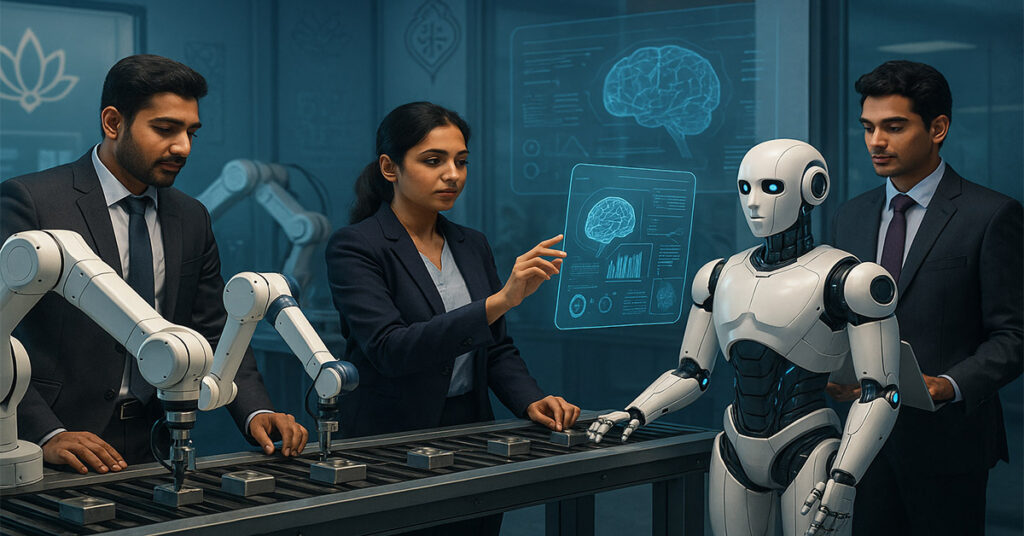The world is experiencing major digital transformation, and AI (artificial intelligence) is at the center of it. AI is a key driver of business automation, changing the way we view automation from simple fixes for repetitive tasks to enhanced customer experience. Whether you are a small business owner or a marketing strategist, learning how AI will influence future automation is critical to staying competitive.

The Rise of AI Tools in Everyday Business
AI tools are being adopted quickly throughout industries to automate tasks, minimize errors, and increase efficiency. AI tools are able to use machine learning algorithms to look at datasets, make predictions, and discover possible courses of action. Businesses are implementing AI software less for new products and programs and more to automate processes (e.g., providing automated customer service) to increase scalability and intelligence in operations (e.g., managing inventory).
For instance, applications like Zapier and Make.com automate various workflows by integrating with several other applications, which can save businesses hours of work. Once powered by AI, businesses could leverage these platforms to determine real-time decisions based on predictive analytical findings as well as behavioral data.
AI for Small Businesses Leveling the Playing Field
In recent times, one of the most thrilling developments has been the availability of AI for small businesses. Formerly, AI was just for large firms with considerable funding. It was apparent that it was plausible to build automation around data without a significant outlay as long as they had access to either open-source machine learning libraries or cloud-enabled AI software.
As it turns out, small businesses, who are traditionally involved with lead generation, now have access to tools to automate email, and simply deploy AI chatbots to provide 24/7 customer support. On top of all this, it’s highly cost-effective, allowing customers to spend less while enjoying improved customer experience and increased conversions.
AI Chatbots The New Frontline of Customer Engagement
AI chatbots are changing the way businesses interact with their customers. These intelligent assistants can handle queries, assist users on websites, and even complete sales — all with no human help. As natural language processing (NLP) improves, these bots are becoming more human-like and able to interpret context and sentiment.
For businesses focused on customer experience and providing retention, utilizing a chatbot makes great sense. It increases productivity as the bot can handle common requests and service levels, allowing human agents to handle tougher issues.
Business Automation Meets Machine Learning
Machine learning is crucial in advancing the automation of work tasks. In short, it lets systems learn from data and improve over time without being programmed to do so each time. This feature means that every time you use a specific AI tool, it will be not only learning but also getting smarter, even though you use the same context every time.
In marketing today, for example, machine learning algorithms can use user behavior data to segment audiences in ways that drive targeted segmentation and personalized campaigns. Users only need to improve their targeting and ad spend efficiency without needing more time. For instance, with marketing, machine learning can support users with predictive analytics, as well as personalizing content and getting customer feedback in realtime to support decisions. These are all crucial components of today’s business success.
Productivity Tools Powered by AI
Productivity tools powered by AI technology are changing the landscape of the modern workplace. From smart scheduling tools such as Clockwise to automated transcription like Otter.ai, these tools are allowing teams to increase their speed and work smarter. While eliminating repetitive work and providing smart suggestions, overall workplace productivity is increased, and consequently time management is improved.
Furthermore, utilizing these tools daily in the work process enables better collaboration and ensures projects are on track even with remote/hybrid teams.
AI in Marketing Smarter Campaigns, Better Results
Artificial intelligence (AI) has become an indispensable tool in marketing. Marketers are already leveraging artificial intelligence software to create dynamic ads, personalize email campaigns, and optimize content for search engines. AI tools such as Jasper, Copy.ai, and SurferSEO use artificial intelligence to generate keyword-dense content that ranks high on Google.
Additionally, AI for lead generation is building its own momentum! AI can study user behavior/engagement patterns to identify high-intent leads and automate appropriate follow-up. Because this solution dramatically reduces the sales cycle, you are typically going to experience a much improved conversion rate.
The Road Ahead Embracing Digital Transformation
As AI develops, the impact on industry and business automation will continue to expand and grow. AI will be used in even more departments and activities, from HR and finance to customer service and logistics. As businesses undergo digital transformation, they will be more agile and disruptive, adapting to the market and staying ahead of competitors. These advancements will allow for greater levels of productivity and automation and reduce risks involved in processes, both strategically and operationally.
In conclusion, throughout the future of automation, AI is making automation easier with smarter technology, more efficient processes, and available access to businesses regardless of size. By utilizing AI-based tools, as well as productivity tools and automation strategies, it will provide companies opportunities for growth, enhanced customer experiences, and new possibilities in a digitally connected world.




































